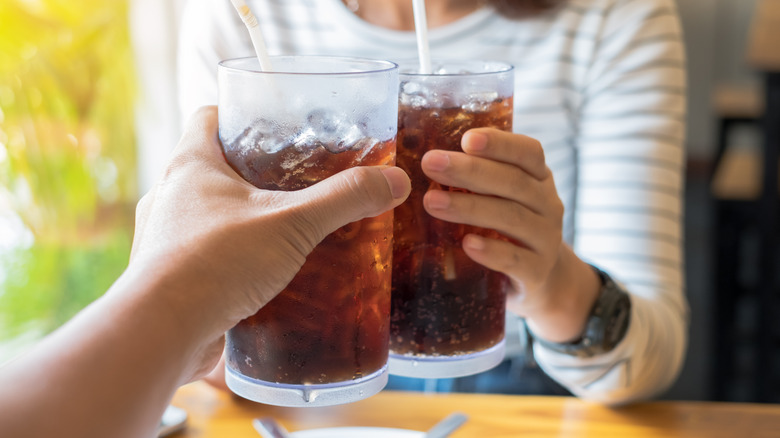The Real Reason You're Craving Soda
If you have a soft spot for soft drinks, you're in good company. While consumption of soda has declined year-over-year for more than a decade, Statista reports that the average American consumed close to 39 gallons of soda in 2018. Soda drinking in the United States remains among the highest in the world.
Soda has been around in some form for several centuries. According to Brittanica, soft drinks appear to have first been marketed in the 1600s as a mixture of water and lemon juice, with honey added for sweetness. Carbonated beverages eventually came on the scene and evolved in Europe. An English clergyman and scientist named Joseph Priestly is dubbed "the father of the soft drinks industry" due to his experiments with gas and carbonation processes. The manufacturing of soda improved in the 1800s, and bottled water varieties that included ginger, lemon, mineral salts, and tonic gained popularity, eventually leading to the invention in the United States of the first cola drink, Coca-Cola, in 1886 (via Brittanica).
Despite an increased awareness that sugary drinks are bad for one's health, it's clear that many people still crave soda. So what's in soda that still keeps millions from being able to make the break?
It's all in your brain
Soda contains ingredients that stimulate your brain's reward centers, and soda manufacturers know just the kinds of stimulants your brain wants (via CNN). One of these, of course, is sugar. "The sugar in the drinks ... swish through the brain, you get the dopamine rewarding you, and then the effect of the dopamine surge is gone almost as fast as it arrived, leaving your brain wanting more," Gary Wenk, director of neuroscience undergraduate programs at the Ohio State University, tells CNN. Cordialis Msora-Kasago, a registered dietitian and nutritionist concurs. "The more soda you drink, the bigger the 'reward,' and as would happen with most pleasurable things, we develop an affinity and want even more of them," she said.
And if you're a regular cola drinker, you're also likely addicted to the inherent caffeine. "Caffeine is one of the most widely consumed psychostimulants in the world ... and it does have an addictive property," Dr. Marilyn Cornelis, an assistant professor of preventative medicine at Northwestern University, tells CNN. The sugar and the caffeine combined may lead to a double-whammy addiction that could leave you with withdrawal, such as headaches and lower concentration, if you consume soda regularly but then go without it. Wenk adds that carbonation also makes soda addictive and that artificial sweeteners in diet sodas can actually make your cravings worse because your taste receptors are left craving a sugar reward (via CNN).
Drinking soda is linked to a host of health problems such as weight gain, teeth erosion, liver disease, and other chronic conditions, not to mention that soda mostly has zero nutritional value, per Healthline. To break your soda-drinking habit, the experts at Healthline suggest cutting back slowly by drinking more water, opting for healthy sweets such as fruit, and reducing stress.


